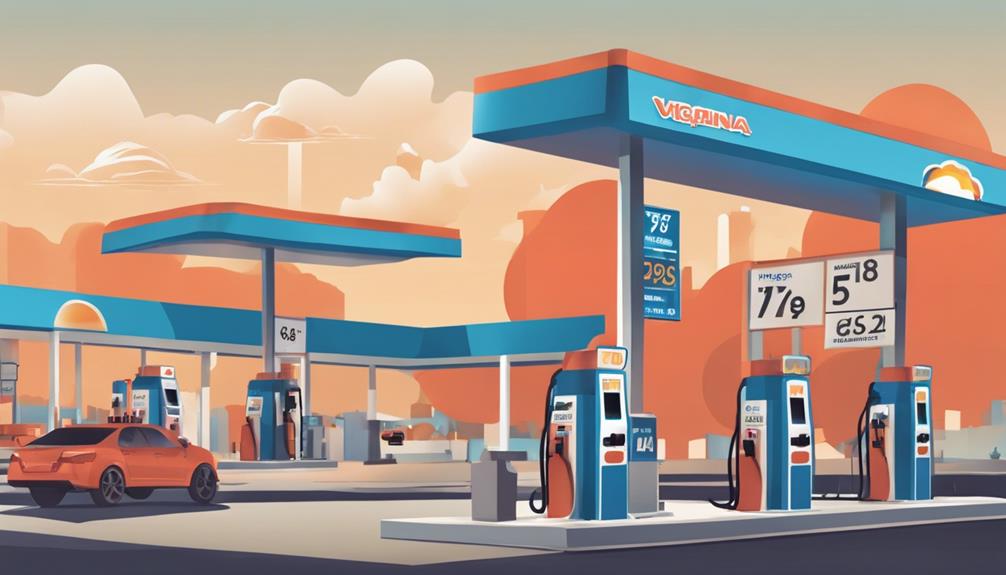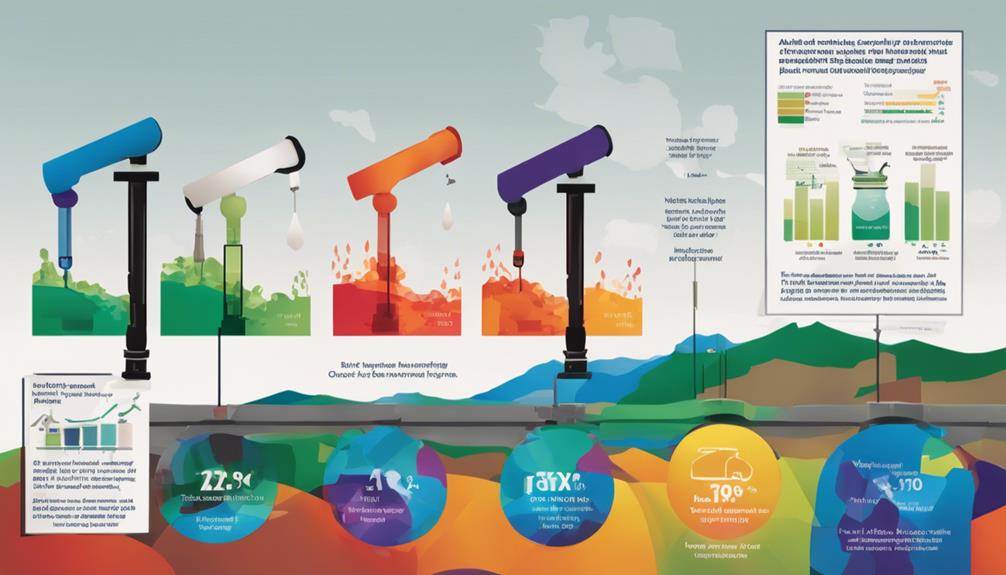When it comes to the Virginia Fuels Tax, understanding the role of blender bonds is crucial for anyone involved in fuel blending. These bonds not only help you meet tax obligations but also open doors to lower tax rates and improved profit margins. As you navigate the compliance requirements, you might wonder how these bonds impact your cash flow and what strategic advantages they could offer. The implications aren't just financial; they extend to environmental considerations and future trends in fuel blending that could reshape the industry. So, where do you start?
Overview of Virginia Fuels Tax

The Virginia Fuels Tax is a crucial component of the state's transportation funding system, impacting both consumers and businesses alike. This tax is levied on gasoline and diesel fuel, and it's essential for maintaining roads, bridges, and public transit. When you fill up your tank, you're contributing to these vital infrastructure projects that keep Virginia moving.
Fuel tax bonds play a significant role in ensuring that businesses comply with tax obligations, thereby supporting the funding necessary for these projects ensuring compliance with tax obligations. You'll find that the tax rate is adjusted periodically, often reflecting changes in fuel prices and economic conditions.
As a consumer, you might notice these fluctuations at the pump, which can affect your budget. Businesses that rely on transportation, such as trucking companies, also feel the impact. Higher fuel taxes can lead to increased operational costs, which may be passed on to consumers in the form of higher prices for goods and services.
Understanding how the Virginia Fuels Tax works is important for making informed decisions about your travel and spending. Staying aware of tax rates and potential changes can help you better plan your finances.
Understanding Blender Bonds
Understanding blender bonds is essential for anyone involved in the fuel industry, especially when it comes to compliance with Virginia's fuel tax regulations. A blender bond is a financial guarantee that ensures you, as a fuel blender, will pay the appropriate taxes on the fuel you produce.
When you blend gasoline with another product, like ethanol, you create a new commodity. This process can affect your tax obligations, and the blender bond helps secure those obligations.
To obtain a blender bond, you typically need to submit an application to the Virginia Department of Taxation. This application includes details about your blending operations and the estimated tax liability. The bond amount usually corresponds to the estimated taxes you might owe, ensuring the state can collect taxes even if you fail to pay them.
It's crucial to maintain your bond in good standing. If you don't comply with the regulations, the bond may be forfeited, leading to financial penalties and potential legal issues.
Familiarizing yourself with the specifics of blender bonds can protect your business and help you navigate Virginia's complex fuel tax landscape effectively.
Benefits for Fuel Blenders

Fuel blenders enjoy several advantages that can enhance their operations and profitability. First, the Virginia fuels tax-blender bond allows you to access lower tax rates on blended fuels, which directly boosts your profit margins. By blending different fuels, you can optimize your costs, taking advantage of price fluctuations in the market.
Additionally, having a blender bond facilitates smoother cash flow management. You won't need to pay taxes upfront, allowing you to reinvest that capital into your business. This flexibility enables you to make strategic purchases and improvements without the immediate financial burden.
Moreover, participating in this program can improve your competitive edge. By offering a variety of fuel blends, you can cater to diverse customer needs, attracting more clients while maximizing sales opportunities.
The bond also helps you remain compliant with state regulations, minimizing the risk of penalties that could impact your bottom line.
Compliance Requirements
Navigating the compliance requirements for the Virginia fuels tax is vital for maintaining your operations and avoiding penalties. To start, you need to register with the Virginia Department of Taxation. This involves providing necessary business details and securing a fuels tax registration number.
Next, you must maintain accurate records of all fuel transactions. This includes invoices, delivery receipts, and any other documentation that supports the quantities and types of fuel you've handled.
Ensure your records are organized and readily accessible, as they may be subject to audits.
Additionally, you'll need to file periodic tax returns. Be aware of the specific deadlines for filing and paying the fuels tax, as late submissions can result in hefty fines.
Depending on your volume, you might be required to make estimated tax payments throughout the year.
Impact on Fuel Prices

Rising fuels taxes directly influence the prices at the pump, affecting both consumers and businesses alike. When the state increases fuel taxes, you're likely to see higher prices for gasoline and diesel. This change can impact your daily commute, making it more expensive to fill up your vehicle.
For businesses relying on transportation, these increased costs can lead to higher operational expenses, which may ultimately get passed down to you as a consumer.
Moreover, fluctuations in fuel prices can create a ripple effect throughout the economy. Higher fuel costs can drive up the prices of goods and services, as businesses adjust to maintain their profit margins. This can affect everything from groceries to shipping fees.
Essentially, every time you head to the pump, you're not just paying for fuel; you're also contributing to broader economic trends.
In addition, if you own a business, you might face tighter margins as you try to absorb these increased costs. This situation can lead to difficult decisions, such as raising prices or cutting back on services.
Environmental Considerations
The environmental impact of fuel taxes can't be overlooked, as they play a crucial role in promoting cleaner energy alternatives. By imposing higher taxes on traditional fossil fuels, these policies encourage you to seek out more sustainable options. When you choose biofuels or renewable energy sources, you're not just cutting costs; you're actively reducing greenhouse gas emissions.
In Virginia, fuel taxes can incentivize the development and use of cleaner fuels, pushing you toward options that have a lower carbon footprint. This shift not only benefits the environment but can also lead to improved public health outcomes by reducing air pollution.
As you become more aware of the environmental consequences of your fuel choices, the demand for greener alternatives grows, driving innovation in the energy sector.
Moreover, these taxes can generate revenue for environmental initiatives, such as funding public transportation or investing in renewable energy projects.
Ultimately, understanding the relationship between fuel taxes and environmental sustainability is essential. By being informed and making conscious choices, you can contribute to a cleaner, healthier planet while navigating the complexities of fuel pricing.
Future Trends in Fuel Blending

Embracing innovative fuel blending techniques is set to transform the energy landscape in Virginia and beyond. As you look towards the future, you'll notice a growing emphasis on integrating renewable energy sources with traditional fuels. This shift not only reduces carbon emissions but also enhances energy security.
You might see advancements in biofuel production, where agricultural waste and other organic materials are converted into cleaner-burning alternatives. These trends will likely lead to a more diverse fuel supply, giving you access to a broader range of options at the pump.
Moreover, technology will play a pivotal role in improving blending processes and efficiency. With the rise of smart blending systems, you can expect better monitoring and optimization, ensuring a more effective mix of fuels that meets environmental standards while maintaining performance.
Conclusion
In summary, the Virginia Fuels Tax and blender bond system create a solid framework for fuel blenders. By securing a bond, you not only reduce your tax burden but also support infrastructure funding and promote cleaner energy alternatives. Staying compliant with regulations ensures smooth operations and can lead to better profit margins. As the industry evolves, embracing these opportunities will position you for success in an increasingly competitive and environmentally conscious market.


